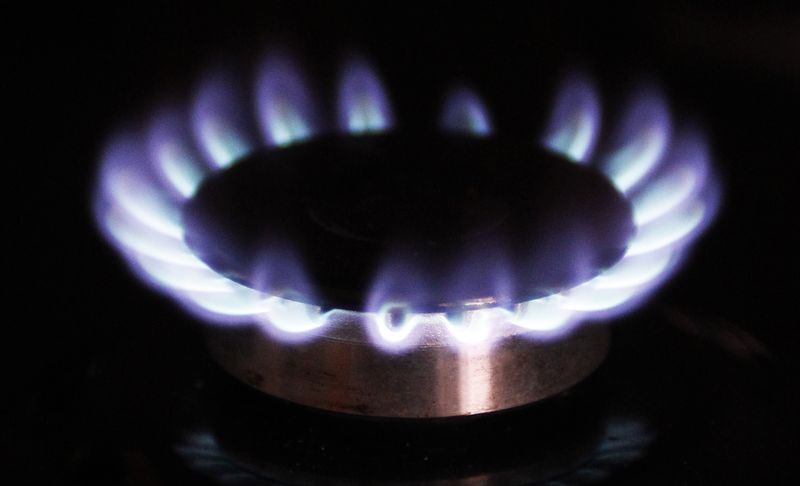By Essi Lehto and Kate Abnett
HELSINKI/BRUSSELS (Reuters) - Europe may face an even more acute energy crunch next year after draining its natural gas tanks to get through the cold of this winter, the head of the International Energy Agency said on Wednesday, as the EU looks for ways to ease the crisis.
European countries have filled storage tanks to around 90% of their capacity after Russia cut gas supplies in response to Western sanctions imposed over its invasion of Ukraine.
Gas prices, which surged in the months after the invasion in February, have retreated. But that could be short-lived as countries compete to buy liquefied natural gas (LNG) and other alternatives to Russian pipeline deliveries.
To help tackle the pain, the European Union is considering a gas price cap, an issue that has divided the 27-nation bloc as some countries worry it could make securing supplies harder.
"With gas storages almost at 90%, Europe will survive the coming winter with just some bruises as long as there are no political or technical surprises," said Fatih Birol, executive director of the Paris-based IEA.
The real challenges facing Europe, which had historically relied on Russia for around 40% of its natural gas, will begin in February or March when storage needs to be refilled after high winter demand has drained them to 25%-30%.
"This winter is difficult but next winter may also be very difficult," Birol told journalists in Finland.
European governments have moved to cushion consumers from the impact of higher prices and on Wednesday, Germany said it will subsidise power bills next year by paying just under 13 billion euros ($12.8 billion) towards the usage fees charged by the four high-voltage transmission grid companies (TSOs).
The fees form part of electricity bills, accounting for around 10% of overall costs for retail customers and a third for industrial companies in sectors such as steel or chemicals.
Berlin's intervention stabilises the fees, which otherwise would have risen three-fold given runaway wholesale power prices and rising operational costs for the TSOs, Germany's economy minister Robert Habeck said.
Until the Ukraine war broke out in late February, the Nord Stream 1 pipeline beneath the Baltic Sea from Russia to Germany was one of western Europe's main sources of gas.
Nord Stream 1 comprises two separate lines as does Nord Stream 2, which was filled with gas, but never allowed to deliver supplies to Europe as Germany suspended authorisation just before Russia invaded Ukraine on Feb. 24.
Three of the four lines have been disabled by what the West and Russia say was sabotage causing huge leaks and the Danish authorities said the fourth was being depressurised on Tuesday.
SABOTAGE?
President Vladimir Putin on Friday blamed the United States and its allies, allegations rejected by Washington. Russia has condemned what it called "stupid" theories in the West that it sabotaged the pipelines itself in explosions last week.
The Kremlin said on Wednesday that Russia must be part of investigations into the incidents, while one of Putin's allies said they recalled the U.S. Central Intelligence Agency-backed attacks on oil infrastructure in Nicaragua in 1983.
European Commission chief Ursula von der Leyen for her part said EU countries needed to step up protection of their critical infrastructure by conducting stress tests and using satellite surveillance to detect potential threats.
She was speaking in the European Parliament ahead of a meeting of leaders of the 27 EU countries on Friday in Prague when they will debate the EU price cap plan.
The details have yet to be worked out, but the idea has support from the majority of countries that see it as a way to deal with inflation. It has, however, faced opposition from Germany, Denmark and the Netherlands that cite concerns it will make it harder to secure supplies.
Von der Leyen said in her speech countries should also start jointly buying gas to avoid EU member states bidding against each other on world markets and driving prices still higher.
Earlier tensions in the gas market had eased as Russia's energy company Gazprom (MCX:GAZP) on Wednesday resumed gas exports to Italy via Austria after resolving an issue over guarantees that had led to the suspension of flows over the weekend.
Map: Leaks reported from Russian Nord Stream pipelines https://graphics.reuters.com/UKRAINE-CRISIS/ENERGY/xmpjozoewvr/leakage-map.jpg

However, Deputy Prime Minister Alexander Novak said on Wednesday that Russia may cut oil production in order to offset negative effects from price caps imposed by the West over Moscow's actions in Ukraine.
The price cap plan agreed by Group of Seven wealthy nations calls for participating countries to deny insurance, finance, brokering, navigation and other services to oil cargoes priced above a yet-to-be-determined price cap on crude and oil products.